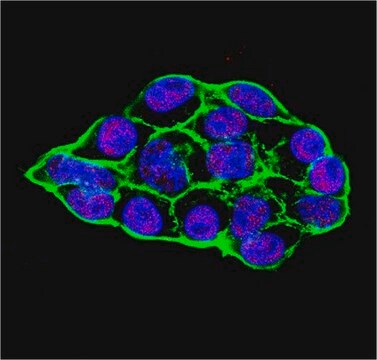S9797
Ten Eleven Translocase
TET1CD mouse recombinant, expressed in in HEK 293 cells
Sinónimos:
CXXC-type zinc finger protein 6, Cxxc6, Kiaa1676, Methylcytosine dioxygenase TET1, Ten-eleven translocation 1 gene protein homolog, Tet1
Iniciar sesiónpara Ver la Fijación de precios por contrato y de la organización
About This Item
UNSPSC Code:
12171500
NACRES:
NA.54
Productos recomendados
recombinant
expressed in HEK 293 cells
Quality Level
form
liquid
concentration
≥1 mg/mL (by bradford)
shipped in
dry ice
storage temp.
−70°C
General description
This product consists of the catalytic domain (CD) of mTET1 (amino acids 1366-2039) and includes an N-terminal polyhistidine tag. It has a calculated molecular mass of 75.8 kDa. This protein is produced in mammalian cells (HEK 293), without the use of serum. The mammalian cells expression system allows proper post-translational modifications and folding, and often supports higher specific activity of the protein.
Biochem/physiol Actions
Mouse ten eleven translocase 1 (mTET1) is a dioxygenase that catalyzes the conversion of 5-methylcytosine (5mC) to 5-hydroxymethylcytosine (5hmC), and plays a key role in active DNA demethylation. mTET1 also causes the sequential oxidation of 5-formylcytosine (5fC), and 5-carboxylcytosine (5caC). The full structure of TET1 includes a double-stranded β-helix (DSBH) domain, a cysteine-rich domain, and a CXXC domain. The dioxygenase activity of DSBH is dependent on Fe2+ and 2-oxoglutarate.
mTET1-mediated cytosine methylation on C5 is a mammalian genome epigenetic modification, which is involved in transcriptional regulation.
TET1 is utilized in TET-assisted bisulfite sequencing (TAB-seq), a method for the identification of 5hmC at single-base resolution, and the determination of its abundance at each modification site. This method is an improvement of the traditional bisulfite sequencing, which has been widely used to detect 5mC at single-base resolution, but cannot differentiate 5mC from 5hmC, as both resist deamination during the treatment of DNA with sodium bisulfite. The TAB-seq method uses mTET1 to selectively convert 5mC to 5caC in two steps: protection of 5hmC through glucosylation, and mTET1-mediated oxidation of 5mC to 5caC.
mTET1-mediated cytosine methylation on C5 is a mammalian genome epigenetic modification, which is involved in transcriptional regulation.
TET1 is utilized in TET-assisted bisulfite sequencing (TAB-seq), a method for the identification of 5hmC at single-base resolution, and the determination of its abundance at each modification site. This method is an improvement of the traditional bisulfite sequencing, which has been widely used to detect 5mC at single-base resolution, but cannot differentiate 5mC from 5hmC, as both resist deamination during the treatment of DNA with sodium bisulfite. The TAB-seq method uses mTET1 to selectively convert 5mC to 5caC in two steps: protection of 5hmC through glucosylation, and mTET1-mediated oxidation of 5mC to 5caC.
Other Notes
Catalyzes the conversion of the modified DNA base 5-methylcytosine (5-mC) to 5-hydroxymethylcytosine (5-hmC).
Storage Class
10 - Combustible liquids
wgk_germany
WGK 1
Elija entre una de las versiones más recientes:
Certificados de análisis (COA)
Lot/Batch Number
¿No ve la versión correcta?
Si necesita una versión concreta, puede buscar un certificado específico por el número de lote.
¿Ya tiene este producto?
Encuentre la documentación para los productos que ha comprado recientemente en la Biblioteca de documentos.
Nuestro equipo de científicos tiene experiencia en todas las áreas de investigación: Ciencias de la vida, Ciencia de los materiales, Síntesis química, Cromatografía, Analítica y muchas otras.
Póngase en contacto con el Servicio técnico








